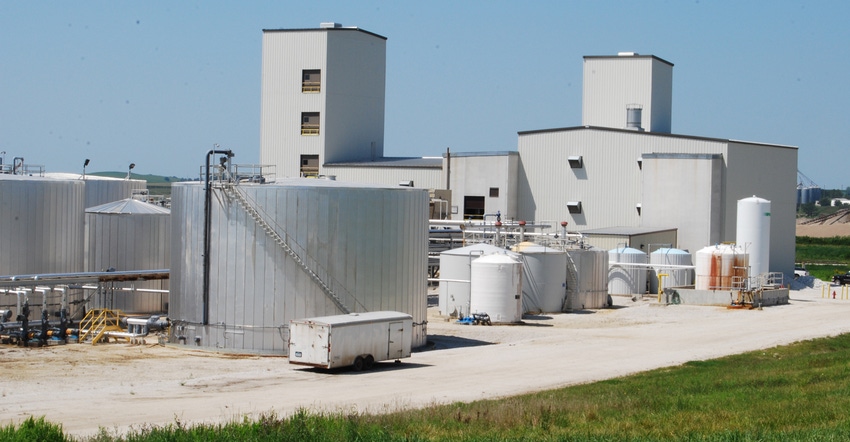January 10, 2019

After a slight decrease in 2017, Iowa’s 12 biodiesel plants rebounded with a record-breaking 365 million gallons of biodiesel produced in 2018.
The increased production largely was because of the plummeting level of biodiesel imports into the U.S. after a verdict against Argentina and Indonesia for illegally subsidizing their biodiesel exports.
“In previous years, American biodiesel producers struggled to compete against unfairly subsidized and dumped imports,” says Monte Shaw, executive director of the Iowa Renewable Fuels Association. “This record-breaking year of production in 2018 proves that when the playing field is level, U.S. biodiesel producers can successfully fulfill domestic demand.”
EPA small refinery exemptions a problem
Iowa produced nearly 20% of U.S. biodiesel production in 2018. Shaw emphasizes that Iowa could produce more if the Renewable Fuel Standard level for biodiesel was set to at least mirror projected U.S. biodiesel consumption and not undermined by small-refinery exemptions.
“We are extremely excited and proud of what was accomplished in 2018, but the fact remains we still have unused production capacity,” Shaw says. “Iowa’s biodiesel plants are ready to grow and produce beyond expectations, and 2018 proved that when the law is enforced equitably they can do that. But when our producers are hampered by timid RFS levels or demand-destroying exemptions, they cannot achieve their full potential.”
EPA continues to allow some oil refineries an exemption from complying with RFS rules. The RFS requires petroleum refiners to blend a certain amount of renewable fuel with their gasoline and diesel fuel each year, but EPA has been granting waivers or financial hardship exemptions, and these exemptions aren’t always going to small refiners. Some major companies also are receiving waivers.
More soybean oil used for biodiesel
Compared with 2017, there was a shift in feedstock usage across Iowa in 2018 toward more soybean oil being used to make biodiesel. Soybean oil increased its market share to nearly 81% while animal fat usage declined from 11% to nearly 5%. Corn oil continued to make up about 10% of the feedstock for biodiesel production. Used cooking oil saw a marginal increase to about 4%.
Other important news for biodiesel is the National Biodiesel Board Fair Trade Coalition’s continued success in preventing unlawful imports of biodiesel into the U.S. from foreign producers who subsidize its production.
Biodiesel imports from Argentina and Indonesia surged by 464% from 2014 to 2016, taking 18.3% of market share from U.S. producers, according to the NBB. This flood of dumped and subsidized imports resulted in market share losses and depressed prices for U.S. biodiesel producers, workers and feedstock suppliers.
In March 2017, the NBB coalition filed antidumping and countervailing duty petitions with the U.S. Department of Commerce and the International Trade Commission, alleging increased volumes of dumped and subsidized biodiesel imports from Argentina and Indonesia unfairly captured market share from U.S. producers, causing harm to the U.S. biodiesel industry.
NBB action helps level playing field
Prompted by the NBB coalition’s petitions, the U.S. government began investigating the unfair trade practices of Argentine and Indonesian biodiesel producers and exporters. After 13 months of fact-finding and litigation, the DOC and ITC ruled in favor of the U.S. biodiesel industry.
The DOC found that the governments of Argentina and Indonesia provided massive subsidies for their own biodiesel industries, NBB CEO Donnell Rehagen says. The DOC also found that Argentine and Indonesian producers and exporters were dumping biodiesel into the U.S. at unfair prices. The ITC unanimously decided that these subsidized, dumped imports financially harmed the U.S. biodiesel industry, contributing to the industry’s declining market share, prices, investment and profitability.
Based on these findings, the U.S. government began imposing tariffs on biodiesel imports from Argentina and Indonesia in August 2017. Since then, there have been zero U.S. imports of biodiesel from Argentina or Indonesia. Based on the final decisions issued by DOC and ITC in late 2017 and early 2018, the U.S. government updated its duty rates.
“Argentina and Indonesia are still free to ship biodiesel into the U.S., but they must do so at fair prices,” Rehagen says.
How long will tariffs be in place?
These antidumping and countervailing duty orders will be imposed for at least five years. The U.S. government then will review whether these orders still are necessary to counteract unfairly traded imports, Rehagen says.
Meanwhile, it appears that Argentine and Indonesian biodiesel producers are focused on overturning the U.S. government’s determinations rather than selling to the U.S. at fair prices and reducing the duty rates through the DOC review process. In 2018, Argentine and Indonesian biodiesel producers filed appeals challenging the DOC countervailing duty and ITC financial injury decisions.
For information, visit biodiesel.org and iowarfa.org.
About the Author(s)
You May Also Like






